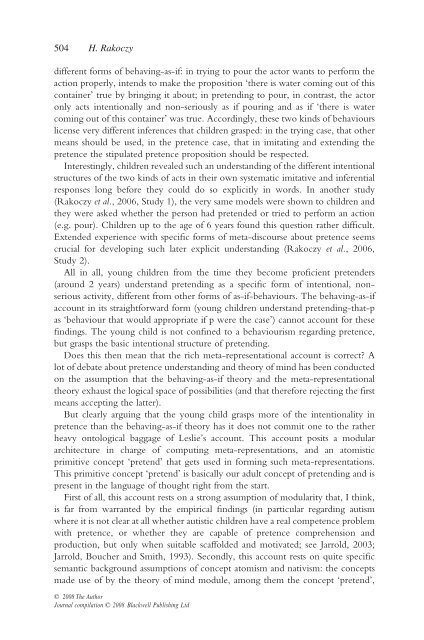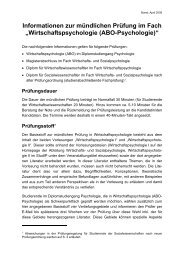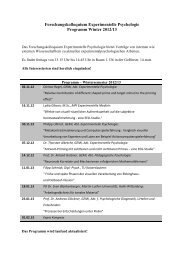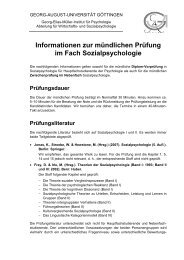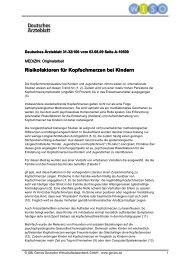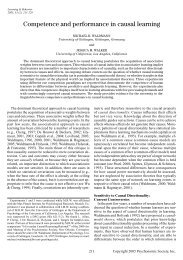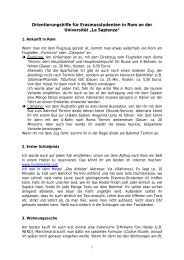Pretence as Individual and Collective Intentionality
Pretence as Individual and Collective Intentionality
Pretence as Individual and Collective Intentionality
You also want an ePaper? Increase the reach of your titles
YUMPU automatically turns print PDFs into web optimized ePapers that Google loves.
504<br />
H. Rakoczy<br />
different forms of behaving-<strong>as</strong>-if: in trying to pour the actor wants to perform the<br />
action properly, intends to make the proposition ‘ there is water coming out of this<br />
container ’ true by bringing it about; in pretending to pour, in contr<strong>as</strong>t, the actor<br />
only acts intentionally <strong>and</strong> non-seriously <strong>as</strong> if pouring <strong>and</strong> <strong>as</strong> if ‘ there is water<br />
coming out of this container ’ w<strong>as</strong> true. Accordingly, these two kinds of behaviours<br />
license very different inferences that children gr<strong>as</strong>ped: in the trying c<strong>as</strong>e, that other<br />
means should be used, in the pretence c<strong>as</strong>e, that in imitating <strong>and</strong> extending the<br />
pretence the stipulated pretence proposition should be respected.<br />
Interestingly, children revealed such an underst<strong>and</strong>ing of the different intentional<br />
structures of the two kinds of acts in their own systematic imitative <strong>and</strong> inferential<br />
responses long before they could do so explicitly in words. In another study<br />
( Rakoczy et al. , 2006 , Study 1), the very same models were shown to children <strong>and</strong><br />
they were <strong>as</strong>ked whether the person had pretended or tried to perform an action<br />
(e.g. pour). Children up to the age of 6 years found this question rather diffi cult.<br />
Extended experience with specifi c forms of meta-discourse about pretence seems<br />
crucial for developing such later explicit underst<strong>and</strong>ing ( Rakoczy et al. , 2006 ,<br />
Study 2).<br />
All in all, young children from the time they become profi cient pretenders<br />
(around 2 years) underst<strong>and</strong> pretending <strong>as</strong> a specifi c form of intentional, nonserious<br />
activity, different from other forms of <strong>as</strong>-if-behaviours. The behaving-<strong>as</strong>-if<br />
account in its straightforward form (young children underst<strong>and</strong> pretending-that-p<br />
<strong>as</strong> ‘ behaviour that would appropriate if p were the c<strong>as</strong>e ’ ) cannot account for these<br />
fi ndings. The young child is not confi ned to a behaviourism regarding pretence,<br />
but gr<strong>as</strong>ps the b<strong>as</strong>ic intentional structure of pretending.<br />
Does this then mean that the rich meta-representational account is correct? A<br />
lot of debate about pretence underst<strong>and</strong>ing <strong>and</strong> theory of mind h<strong>as</strong> been conducted<br />
on the <strong>as</strong>sumption that the behaving-<strong>as</strong>-if theory <strong>and</strong> the meta-representational<br />
theory exhaust the logical space of possibilities (<strong>and</strong> that therefore rejecting the fi rst<br />
means accepting the latter).<br />
But clearly arguing that the young child gr<strong>as</strong>ps more of the intentionality in<br />
pretence than the behaving-<strong>as</strong>-if theory h<strong>as</strong> it does not commit one to the rather<br />
heavy ontological baggage of Leslie ’ s account. This account posits a modular<br />
architecture in charge of computing meta-representations, <strong>and</strong> an atomistic<br />
primitive concept ‘ pretend ’ that gets used in forming such meta-representations.<br />
This primitive concept ‘ pretend ’ is b<strong>as</strong>ically our adult concept of pretending <strong>and</strong> is<br />
present in the language of thought right from the start.<br />
First of all, this account rests on a strong <strong>as</strong>sumption of modularity that, I think,<br />
is far from warranted by the empirical fi ndings (in particular regarding autism<br />
where it is not clear at all whether autistic children have a real competence problem<br />
with pretence, or whether they are capable of pretence comprehension <strong>and</strong><br />
production, but only when suitable scaffolded <strong>and</strong> motivated; see Jarrold, 2003;<br />
Jarrold, Boucher <strong>and</strong> Smith, 1993 ). Secondly, this account rests on quite specifi c<br />
semantic background <strong>as</strong>sumptions of concept atomism <strong>and</strong> nativism: the concepts<br />
made use of by the theory of mind module, among them the concept ‘ pretend ’ ,<br />
© 2008 The Author<br />
Journal compilation © 2008 Blackwell Publishing Ltd


